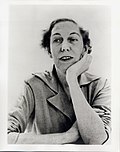Plot
"The Wide Net" is presented from a third-person point-of-view by a reliable narrator. The story is set in a rural village along the Natchez trace in the American Deep South.
The young William Wallace Jamie is the newlywed husband to Hazel, his child-bride. The pretty daughter of doting parents, Hazel is three months pregnant. As such, she resists William's sexual advances - "stuck out her tongue or ran around the table" at her husbands' advances. [6] He retaliates by going on an overnight drinking spree with two of his friends. Arriving home the next morning, he is irritated to find that she is not awaiting his return. He is further alarmed by a note she has written, declaring she has walked to the nearby Pearl River to drown herself.
Panicked by this development, William enlists the support of one of his drinking buddies, as well as members of two local families, the Malones and the Doyles, to discover her whereabouts. Together they march to the home of Doc, the local wise man and the only owner of a large net - the "wide net" of the story's title - used to haul the river to retrieve submerged corpses in case of drowning.
William, Doc and company proceed to the Pearl River and spend the day dragging the river. The ensemble is distracted by the abundant wildlife, including alligators. An intense electrical storm drives the searchers to temporarily seek cover. By noon they are occupied with fishing, and enjoy a fish fry, after which they all take a nap. William remains anxious and distracted by the ordeal: he astonishes his companions when he forgets the name of the river they are dragging. Doc offers sententious observations on the proceedings.
No body is recovered. The search party disperses and William returns home. There he finds Hazel: she admits she had concealed herself and secretly observed him read the note and depart that morning. After William spanks Hazel for her childish subterfuge, the couple reconciles. [7]
Theme
Literary critic David McWhirter characterizes the story as a comic critique of some early 20th century American male fiction, in particular the "beleaguered masculinity" found in the works of T. S. Eliot, William Faulkner and Ernest Hemingway. [9]
"The Wide Net" consciously interrogates and transforms a persistent and central paradigm in modernist constructions of masculinity, one which premises manhood on a horrified flight from female sexuality, and especially...in manifestations of women's reproductive functions including menstruation, pregnancy, childbirth, and abortion. [10]
This page is based on this
Wikipedia article Text is available under the
CC BY-SA 4.0 license; additional terms may apply.
Images, videos and audio are available under their respective licenses.
